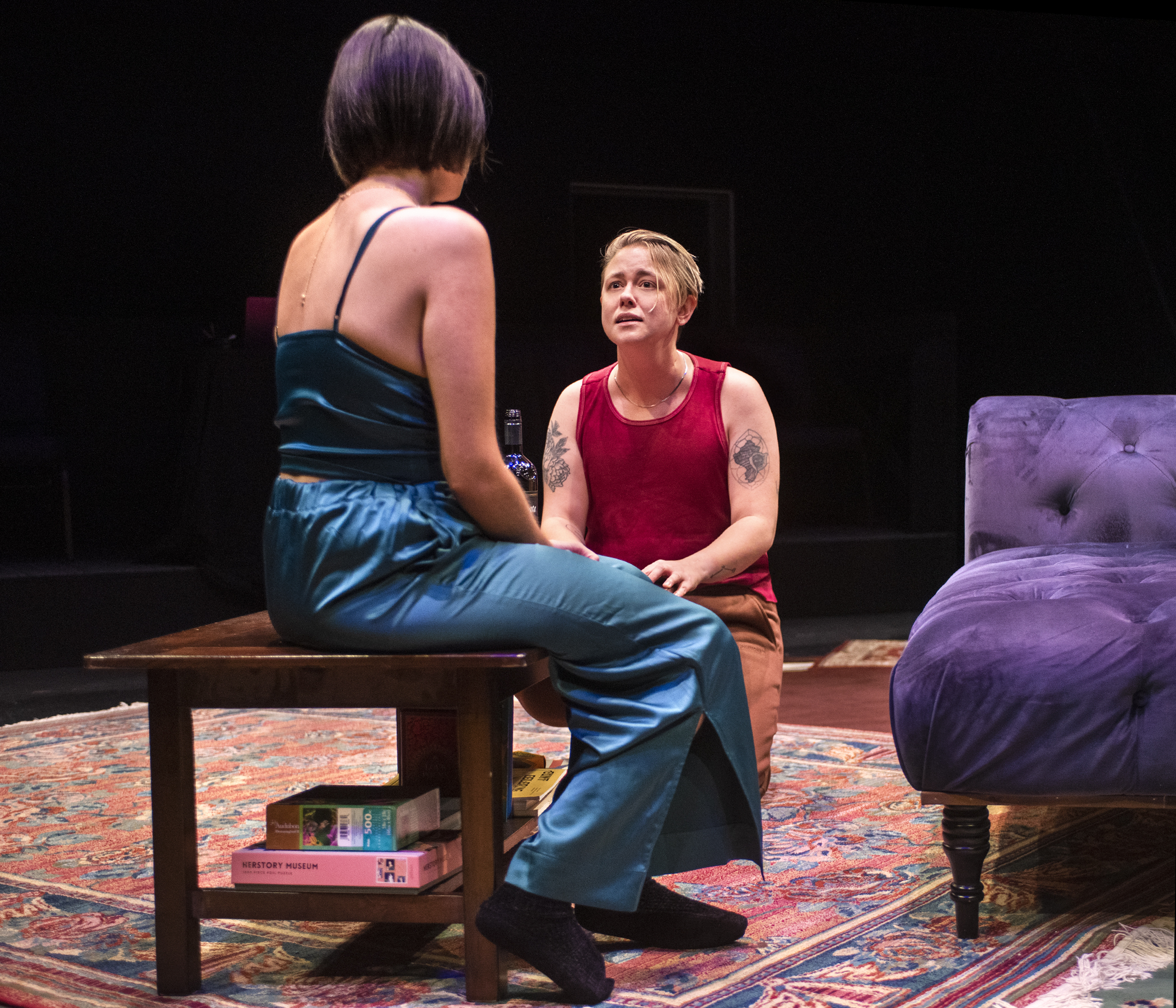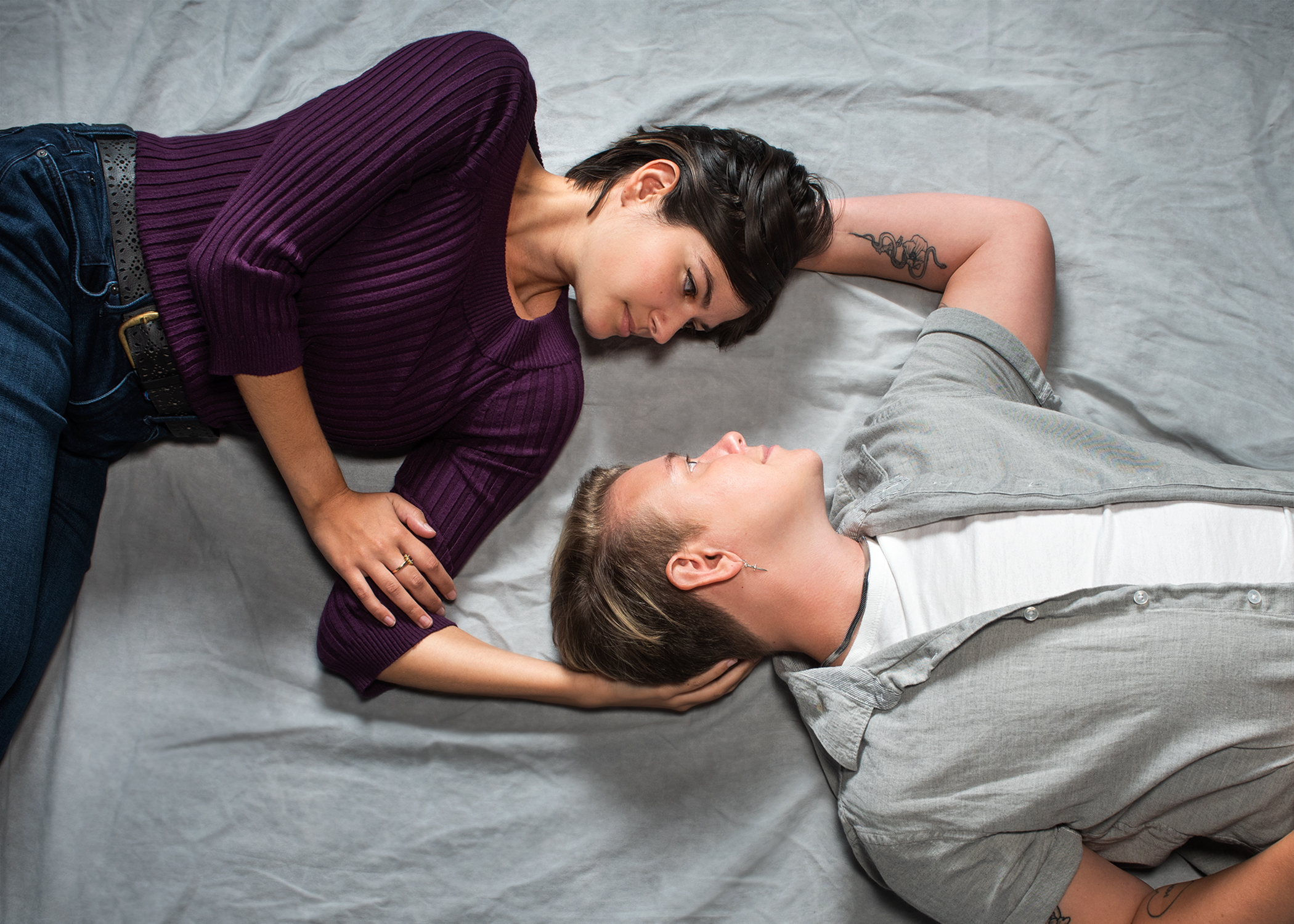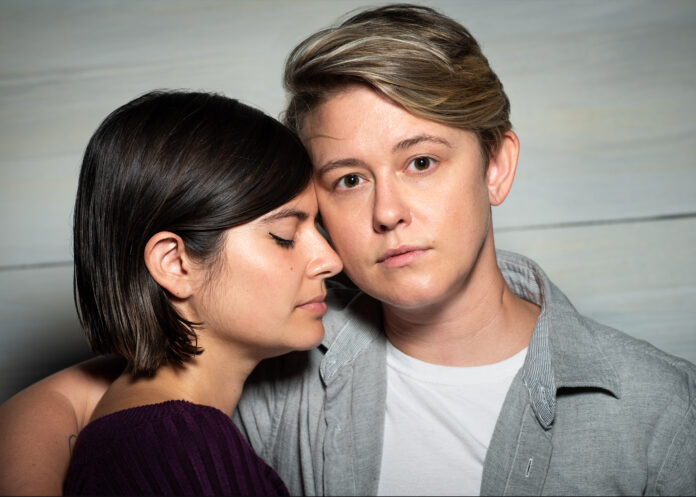Along with Father/Daughter at Aurora Theatre in Berkeley, there are currently two shows in which intimate relationship dramas are played out over a prominent piece of furniture that sits center-stage. The divan in the New Conservatory Theatre Center production of Plot Points in Our Sexual Development (running through December 19) closely resembles the type of chaise lounge often associated with psychiatry, serving as both a clue to how the characters got here and a nod to how sincerity is as necessary in therapy as with one’s spouse.
Granted, we don’t meet our characters during a therapy session, but it seems likely that one was the impetus behind the exercise in which we find them. Cecily (Akaina Ghosh) and her trans partner Theo (Ezra Reaves) are recounting their sexual histories over a bottle of red. Not just when they first had sex and with whom, but also their personal histories of understanding sex as a concept. They tell of elementary school classmates who went on and on about what did and didn’t get your pregnant, and accidental encounters with inanimate objects that wound up resulting in orgasms. Both recount a number of boys (and grown men) and the looks those guys would give them. There’s a particularly hilarious story as to why Cecily has an affinity for a certain “c”-word.

Most of all, they recall and understand just how they truly became aware of their own bodies. These tales range from a Catholic upbringing in which non-marital sex was associated with STDs, to having sex explained by an audio tape during a trip to Hershey Park. We audience members are taken by the hand and guided through each partner’s sexual awakening, which produced as much terror as they did joy. The fourth wall is occasionally broken, for an intimate exchange of heartbreak tales and hot moments of passion that go beyond any simple exchange between partners. The two interact with us, seemingly because it lets them know they aren’t alone in these experiences.
But why, you may wonder, are they sharing these stories at all, if not for our amusement? (Or edification—the production is being presented in partnership with the San Francisco Office of Transgender Initiatives and the Transgender District.) After all, the back-and-forth nature of their exchange has an almost-vaudevillian air of two comedians trying to one-up each other by telling the same joke different ways, a là The Aristocrats. But it becomes clear that Cecily and Theo aren’t competing with one another—or at least, they shouldn’t be. Though no therapist is explicitly mentioned, we learn their exchange is a deliberate couple’s exercise meant to seal a crack that has developed in their relationship.
Incidentally, the couple telling us how they became comfortable in their own bodies have never been completely comfortable with each other’s bodies. It’s the sort of thing someone would mistakenly dismiss as a non-issue, until it very much becomes an issue. The longer it’s ignored, the worse it becomes, and Cecily and Theo may have finally reached a breaking point. They’ve turned their respective sex lives into narratives, because they want to how this most recent twist came about.

Under the direction of Leigh Rondon-Davis (star of a similarly intimate couples’ drama at the Shotgun Players last year), the humor and, for lack of a better term, danger of Miranda Rose Hall’s script doesn’t drag, even at a brisk 55-minute runtime. No matter your identity or sexual history, its recounting is bound to include surprise delights and sad, missed opportunities. By placing the action in the round of a set walled with framed tchotchkes (no specific scenic designer is named), Rondon-Davis intentionally blurs the line between the audience-as-mere-observer and audience-as-intruder; we feel we shouldn’t be here, but we can’t miss the next story told.
The always-reliable Akaina Ghosh (who I’ve directed before, in a short play for Shotz! SF) adds another impressive and natural performance to their resume, bringing both a great deal of humor to Cecily’s Catholic guilt, and an air of tragedy in imparting the knowledge that their romance may have soured. I’m not familiar with the work of Ezra Reaves, but he is fully realized as a character that would otherwise just be a plot point in the tired story of a straight girl’s sex history.
Of the two shows currently running on both sides of the Bay, Plot Points in Our Sexual Development finds its edge in the way its story and characters unfold, rather than being forced upon the audience. Granted, both shows are well-directed, with strong racial- and gender-diverse casts. What’s more, they both take place in theaters that allow for just big enough of an audience to make an impression, yet small enough that hopefully everyone feels comfortable.
Because when dealing with the topic of body image and sexual history, the comfort of everyone involved—including the public—needs to be the highest priority.
PLOT POINTS IN OUR SEXUAL DEVELOPMENT Runs through December 19. New Conservatory Theatre Center, SF. More info and tickets here.




